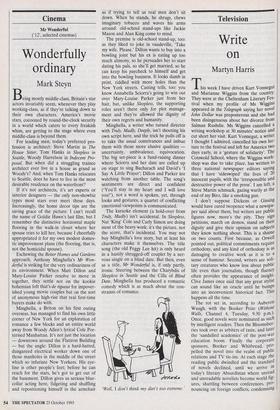Television
Write on
Martyn Harris
This week I have driven Kurt Vonnegut and Marianne Wiggins from the country• They were at the Cheltenham Literary Fes- tival when my profile of Ms Wiggins appeared in the Telegraph saying her novel John Dollar was preposterous and she had been disingenuous about her divorce from Salman Rushdie. Ms Wiggins cancelled a writing workshop at 30 minutes' notice and cut short her visit. Kurt Vonnegut, a writer I thought I admired, cancelled his own lec- ture to the festival and left for America two days early, in a 'gesture of solidarity'. The Cotswold School, where the Wiggins work- shop was due to take place, has written to three national newspaper editors saying that I have 'sideswiped' the lives of 20 innocent pupils, with the 'irresponsible and destructive power of the press'. I am left, a Steve Martin schmuck, gazing warily at the end of my Biro, like a smoking gun.
I don't suppose Dickens or Gissing would have cared twopence what a newspa- per said about them, but writers are public figures now, more's the pity. They sign petitions, march on demos, stand on their dignity and give their opinion on subjects they know nothing about. This is a shame on two counts. First because, as Orwell pointed out, political commitments require orthodoxy, and any kind of orthodoxy is as damaging to creative work as it is to a sense of humour. Second, writers are soli- tary creatures who know less about public life even than journalists, though fluency often provides the appearance of insight. Clive James once said that any great stylist can sound like an oracle until he bumps into an inconvenient historical fact. This happens all the time.
The rot set in, according to Auberon Waugh, with the Booker Prize (Without Walls, Channel 4, Tuesday, 9.30 p.m.). Once, good novels were nominated as such by intelligent readers. Then the Bloomsber- ries took over as arbiters of taste, and later the 'sandalled academics' of the post-war education boom. Finally the corporate sponsors, Booker and Whitbread, pro- pelled the novel into the realm of public relations and TV tie-ins. At each stage the reading public dwindled and the standard of novels declined, until we arrive in today's literary Absurdistan where unread and unreadable novelists become world fig- ures, shuttling between conferences, Pro' nouncing on foreign conflicts, condemning
incorrect regimes and adjudicating on issues of racism, sexism and ecology with equal assurance.
The Booker at best provides a useful short-list of things that might be worth reading this year, but on the whole its record is dim: John Berger wins with the embarrassing G; Nadine Gordimer with the forgotten The Conservationist; Stanley Mid- dleton with the mysterious Holiday and Ken Hulme with The Bone People another unread and largely forgotten work, though few who witnessed it will forget her Maori nominees collecting the prize in feathered costume, while chanting a native dirge. Meanwhile, two of the best books of the last 20 years, John Fowles's French Lieutenant's Woman and Martin Amis's Money, are not even shortlisted. Our great- est living novelist, Anthony Burgess, had his best book rejected in favour of one of William Golding's worst. When a newspa- per recently send out manuscripts of the first Booker winner, P.H. Newby's Some- thing to Answer For, it was rejected by ten Publishers. When another paper inserted £5 vouchers in the middle of Ben Okri's Famished Road, no one claimed the money, suggesting nobody even read it. So what standards are operating here? Each list each year seems increasingly d. ominated by political correctness, crony- ism and what Waugh describes as 'the Penelope Principle', which says that when in doubt you give the Booker to a nice English lady novelist of that name. Above all, Perhaps, is the fear of seeming stupid, Which disqualifies accessible work in favour of the obscure — which often means no more than badly written. Would Priestley or Wells or Maugham win a Booker prize? rflo I need to ask?



































































 Previous page
Previous page